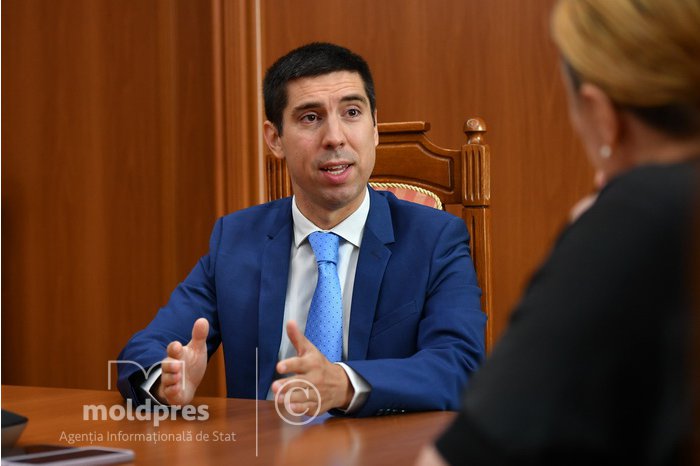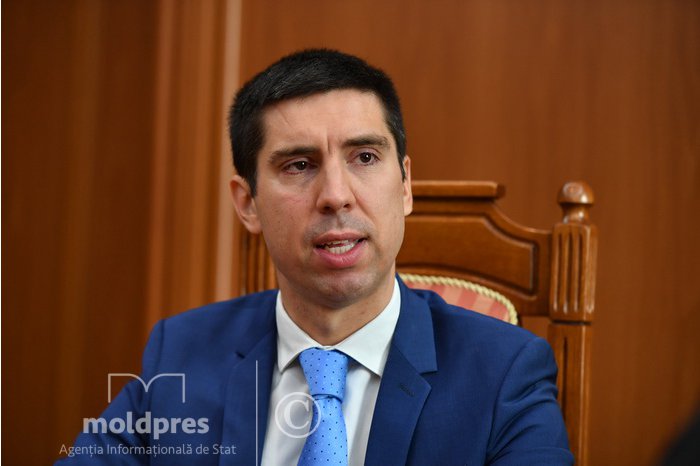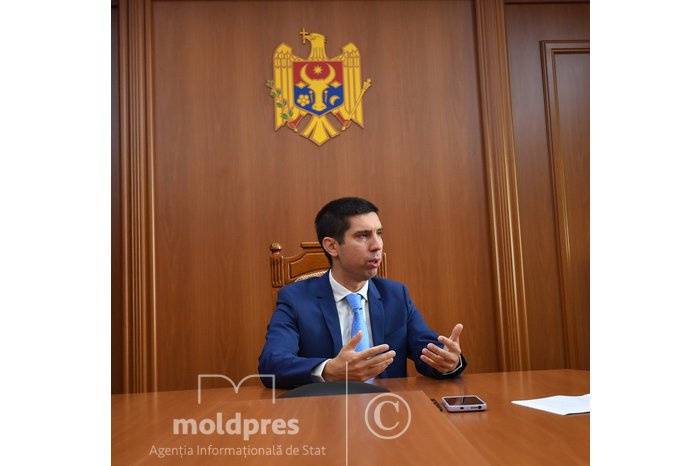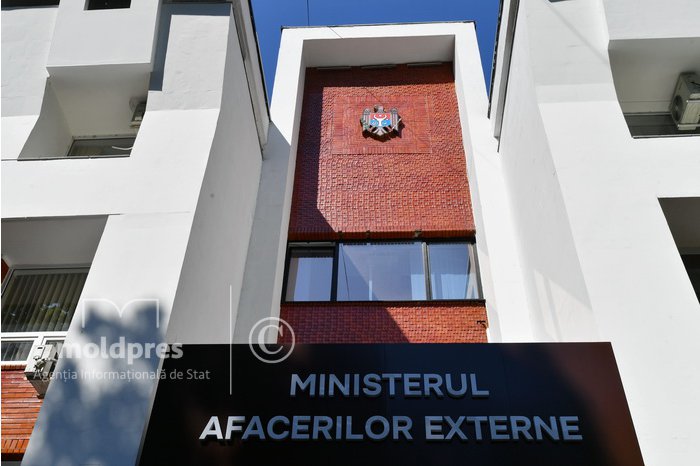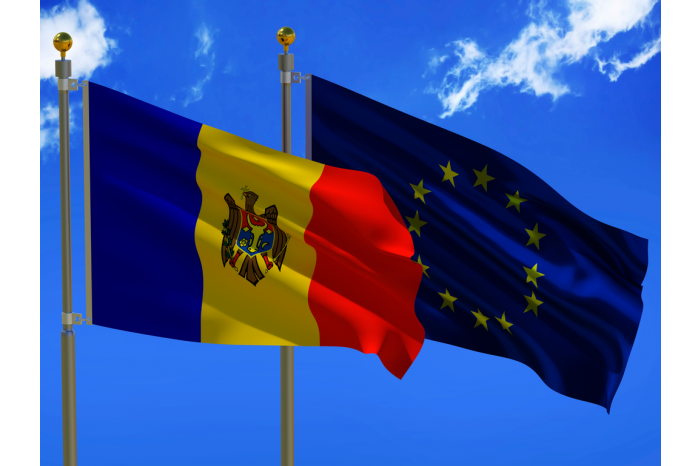EUROPEAN MOLDOVA // Deputy Prime Minister: Accession negotiations to be completed well before 2030
22:05 | 01.08.2024 Category: Interview, Event
Moldova applied for EU membership on 3 March 2022
Moldova was granted EU candidate status on 23 June 2023
On 14 December 2023, the European Council decided to open accession negotiations with Moldova
On 25 June, the European Council decided to open EU accession negotiations
Moldova undergoing assessment of the alignment of national legislation with European Union law, a first step for our state’s accession to the EU
Authorities aim for Moldova to join the EU by 2030
Interview given to MOLDPRES State News Agency by Deputy Prime Minister, Minister of Foreign Affairs Mihai Popșoi
MOLDPRES: Deputy Prime Minister Mihai Popșoi, you have taken over the leadership of the Ministry of Foreign Affairs at a crucial period for Moldova's European path. On June 25, the European Council decided to officially open EU accession negotiations, and Moldova is now in the process of assessing the compatibility of national legislation with that of the European Union. What are currently the main challenges on the European integration agenda?
Mihai Popșoi: The main challenge right now is our internal capacity to use this great opportunity and we are in the process of identifying people, putting processes in order so that, step by step, we can build the foundations of our European future, despite those well-known difficulties we have related to human capital, related to our ability to navigate in those extremely complicated technical fields. Deputy Prime Minister Gherasimov will provide more details on the difficulties and also on the successes we have in this area.
The difficulties are related to our internal organization, related to the capacity of our missions, or the lack of them in some important European countries where we have no diplomatic presence. Despite modest resources, our diplomacy has excelled and will certainly continue to excel for the good of our citizens.
MOLDPRES: You mentioned the lack of diplomatic missions in some European countries. Does the Republic of Moldova plan to open embassies in other EU countries? Which European countries are showing interest in our state and will open diplomatic missions in Chisinau?
Mihai Popșoi: A whole string of European countries have already declared that they will open embassies. In recent years, a huge number of embassies have been opened in Moldova. We are talking about the Kingdom of the Netherlands, Spain, Greece, Denmark. The opening of the Norwegian Embassy is now underway. Next year the opening of the Irish embassy is planned. There are very few countries that do not have embassies in the Republic of Moldova, and the Republic of Moldova still does not have embassies in a relatively larger number of European countries. We would certainly like to have a diplomatic and consular presence in all EU member states, but our expectations and desires usually collide with a complicated, austere budgetary reality and we cannot necessarily afford to do this, but we will try step by step, including through alternative measures such as this proposal which we have now and I hope to implement soon to have non-resident ambassadors, which is more for more distant states than for states in the European Union. This will give us the possibility to increase the presence of our diplomacy at certain lower costs than opening certain missions abroad. Our diplomacy, despite limited resources, delivers remarkable successes and this is recognized by everybody.
MOLDPRES: Are any EU members hostile to Moldova's EU membership? What efforts is Chisinau's diplomacy making to convince Western capitals that Moldova's place is with EU member states?
Mihai Popșoi: Getting here was not easy. It was an effort of many years. In the last few years there have been quite intense events in the diplomatic field, but our colleagues in the missions abroad, as well as those here at the ministry have worked enormously to open this opportunity for the Republic of Moldova, or rather to use it. However, the opening up of this opportunity is largely thanks to President Sandu, her personal relations and the trust that she enjoys among European leaders, among the leaders of the Member States, which was also seen during the European Political Community that Sandu and the Republic of Moldova hosted last year. Thanks to this openness, as I was saying, our diplomats are making the most of this opportunity and certainly, whether it is our ambassador, the head of the mission to the European Union, Daniela Morari, or other colleagues in European capitals or the head of the European Integration Directorate within the Ministry of Foreign Affairs, Mr. Caras, these joint efforts of our team, our diplomacy, together with the presidency, colleagues of the branch ministries of the Government we have succeeded in a difficult geopolitical context to bring the Republic of Moldova to a new stage, a stage that is extremely advanced compared to other countries when it comes to the European integration. It is now the responsibility of our diplomats to continue to maintain the extremely good relations that have been built up by Madam President, Mr. Popescu, and our entire great team, so that we can maintain these good relations and improve them where possible.
MOLDPRES: Do you think that there could be some European countries that would be reluctant to Moldova's accession to the European Union?
Mihai Popșoi: I cannot know what will be in the future, I can say what it is at the moment. At the moment, there is no EU Member State that would express certain reservations or have a reticent approach towards the Republic of Moldova. Our country has excellent relations with absolutely all the Member States and this has been seen and will continue to be seen in the context of a series of important visits which we will be making to the Republic of Moldova, but the representatives of the Republic of Moldova will also continue to have this intense exchange of visits in order to strengthen bilateral relations with the EU member states, as well as with the heads of the European institutions. It is proof of these very close relations based on mutual respect, understanding and appreciation of the interests of both sides. Our partners in the European Union have always been understanding, they have always supported us. It is our responsibility to continue to work so that such difficulties do not arise.
MOLDPRES: The Republic of Moldova and Ukraine are moving together on the European integration, the two countries are being treated both in terms of the reforms they have to make in order to join the EU. Is the security situation in the region, caused by the war unleashed by the Russian Federation against Ukraine, likely to influence Moldova's European path?
Mihai Popșoi: It is obvious that we have already advanced, when it comes to the European integration process, and the situation in Ukraine, the aggression of the Russian Federation against Ukraine, of course, is an important element in the regional security context. At the moment, the determining factor, when it comes to the European integration process, is the capacity, degree, intensity and quality of the reforms which we are implementing in the Republic of Moldova. The more advanced we are in implementing those reforms which both the citizens of our country and our international partners expect of us, the closer we will be to the goal we have set of joining the great European family by 2030. This would mean that the negotiations will be finalized well in advance, so that there will be enough time to ratify those agreements.
In spite of the difficulties we have, the Republic of Moldova is today stronger, more resilient and much more advanced on its European agenda and this is recognized by all our international partners and the citizens of our country know this.
MOLDPRES: Moldova's rapprochement with the EU is causing animosities in Moscow, and diplomatic relations between Moldova and the Russian Federation are currently quite tense. How do you explain the harsh reactions of Russian officials against the current Moldovan government?
Mihai Popșoi: It's a matter of great frustration and a huge dose of envy, and even the leaders of Russian diplomacy, if we can call them that, lost all contact with diplomacy a long time ago. The envy lies in the fact that the Republic of Moldova - a small country with modest resources - is succeeding, it is a country that is making progress. Even those who criticize us, who attack us with unfriendly language, understand that the prosperous, peaceful future is only in the European family, and they look with envy at the rise of the Republic of Moldova, the progress we are making, including in strengthening democratic institutions. It is a great frustration. Moldova is succeeding thanks to the ambition that it has, the ambition to be part of the great European family, thanks to the strengthening of society and the ability to withstand this avalanche of propaganda, fake news, all kinds of insinuations, harsh attacks from Kremlin and other institutions in the Russian Federation on the Republic of Moldova, hybrid attacks, cyber attacks. This belligerent language of the so-called Russian diplomats leaves us cold. We know what we have to do, we know where our national interests lie, we know how to defend them, but their frustrations which they vent daily in the public arena leave us cold.
MOLDPRES: You recently told the Moldovan media that there could be new expulsions of Russian diplomats from the embassy in Chisinau if Moscow continues its actions against Moldova's national interests. Can you give more details?
Mihai Popșoi: I cannot give more details, it was a more general phrase. Any sovereign country, any self-respecting country defends the interests and security of its citizens, and those who threaten this security certainly have no place in the Republic of Moldova.
MOLDPRES: There have been several reports about the activity of the Moldovan Consulate in Moscow. Are you satisfied with the work of this institution?
Mihai Popșoi: There are difficulties, there are some internal quarrels. We will make efforts to reset the Consulate and the entire mission, so as to reduce or ideally to eliminate these conflicts that do not cope with the mission there.
MOLDRES: Over the past year, the Republic of Moldova has strengthened its alignment with EU restrictive measures, including those targeting the Russian Federation. Thus, our country registered an increase in the rate of alignment from 64% in 2022 to 88% in 2023. What sanctions against the Russian Federation have we not aligned with and why?
Mihai Popșoi: There are a number of sanctions in the financial-economic area. The sanctions framework was started in 2014 and we did not align then and it has developed over time. Once you are not aligned with the primary framework, you cannot align with the secondary framework, arising from the way the sector operates.
The financial assets of the Russian Federation or mechanisms that the Republic of Moldova would have to implement in practice do not exist. On the other hand, there is the risk of a symmetrical or rather asymmetrical response in the case of our exports to the Russian Federation, especially in the agricultural sector, and in the industrial sector. There are a number of items of equipment in the electro-energy sector on which we depend, we depend on manufacturers in the Russian Federation. That is why this alignment has remained within the framework that we committed to a long time ago and our international partners in the European Union understand these vulnerabilities that we have and there is no pressure on us to do more than is reasonable in the context of the economic and security difficulties that we are facing.
MOLDPRES: The Ministry of Foreign Affairs initiated last year the development of eConsulat platform aimed at improving the quality of services provided to citizens through Moldova's diplomatic missions and consular offices. When will the platform be launched and what services will our citizens abroad be able to benefit from?
Mihai Popșoi: This platform is being developed and implemented. Digitization of processes is an important element of the growth of public services, both those provided abroad and those provided in the Republic of Moldova, and we will strive to facilitate the process of obtaining those documents that our citizens abroad need. To facilitate this process, we are introducing these eConsulate modules. At the same time, we are implementing new biometric data capture equipment.
MOLDPRES: What do you discuss with the diaspora when you go on visits abroad and meet our citizens? What message do fellow countrymen settled in EU member states come with, or would the massive exodus to Europe be a proof that our citizens are choosing a life according to European standards?
Mihai Popșoi: This part is one of the most pleasant parts of my mission, to meet our diaspora citizens, who are successful, respected people in their communities, wherever they go. My counterparts and the partners I meet appreciate the contribution of our diaspora, be it in France, Germany, the UK, Ireland, Italy, Spain - all over the world our citizens are housekeepers, people in their place, they glorify their name and their country. The opportunity to meet them is a great honor for me. It is true that there is also a certain amount of pain because they have left the country. Our hope is that at some point, our citizens will start to return, as has happened in most of the known countries that have gone through massive immigration. The return of our citizens from the diaspora, whether first generation or second generation, with the experience, knowledge, skills and capital gained there to be invested in the Republic of Moldova, will be that important engine which will help our country to rise. Our messages have been ones of gratitude for their involvement in the socio-economic processes at home. We are doing everything in our power to help the Republic of Moldova to progress, to become closer to those standards that they have become accustomed to seeing and living in the countries where they have found themselves, where they have left. We always try to come up with a reciprocal approach, we continue to offer constant, qualitative consular support. We want to offer these development opportunities at home through these diaspora attraction programs, that financial support for the investments they make in the Republic of Moldova.
The main thing we are doing is both for the citizens at home and for those who have left - to improve the quality of life in the Republic of Moldova, so that those who are left behind do not leave and those who have left want to come back slowly, either they or their children, who will want to invest in the country of origin of their parents.
MOLDPRES: Mr. Popșoi, Moldovan citizens are urged to participate in a referendum on Moldova's European integration this fall. The authorities intend to enshrine the strategic goal of European integration in the Constitution, if citizens will vote in the plebiscite in favor of this goal. What are your arguments to convince Moldovans that EU integration is the right choice for the future of our country?
Mihai Popșoi: Politicians often misuse the term "historic moment", everything that is more important is labeled as a historic moment. It's hard to underestimate the importance of this event that we are all going to experience on October 20. However, we have never had such a referendum on such an important subject for decades to come, for our country. We have had several referendums, which have failed, which were organized, we know well how they were. Now, that turning point that we, the younger generation, the generation of independence, have been waiting for many years. Yes, efforts were made previously to bring the Republic of Moldova closer to the European Union, but it was not to be. In the 1990s, we did not succeed, and in the 2000s there was again a long period of failures when it came to getting closer to the great European family. In the 2010s, things seemed to be on a positive track for this great disappointment for the whole country, when the success story was smashed against a wall of corruption and lack of political far-sightedness on the part of the elites who were then leading the Republic of Moldova.
Now Moldova has another chance. Rarely do countries get such a great chance. Nor do people get a second chance in life to rebuild their future. The Republic of Moldova has this chance, and it will depend to a large extent on the mobilization of citizens, on their awareness of this great opportunity, but also on the mobilization of citizens to take part in this democratic plebiscite.
We are confident that most citizens realize the importance of this moment and just as our neighbors and friends all over Eastern Europe starting with the Baltic States, Poland and our brothers in Romania, Bulgaria, more distant states that joined the EU long before, were in a similar situation to us.
In the case of the Republic of Moldova, the opportunity of joining the European Union is the only way to put the country on a safe footing and to provide the prosperity that we want and deserve for our hard-working, responsible citizens, whom our partners in the European Union, wherever they may be, value so highly. We can also do here at home those beautiful things that happen in European capitals, invest in infrastructure, schools, hospitals. This can and is already happening.
That vote that the citizens are going to cast on October 20 will determine the degree and the extent to which we will continue to move forward on this strategic path for our country, or we will continue to stall, or even worse - we will go back to where we started and continue this endless carousel of one step forward, two steps back, which has kept us away from the great European family all these thirty years. We have no moral right to miss this chance and we are confident that the citizens of the Republic of Moldova understand this and will come out in large numbers on October 20 to the polls to vote for their future, for their children, for their communities and for the whole country.
Interview by Cornelia Stefoglu
